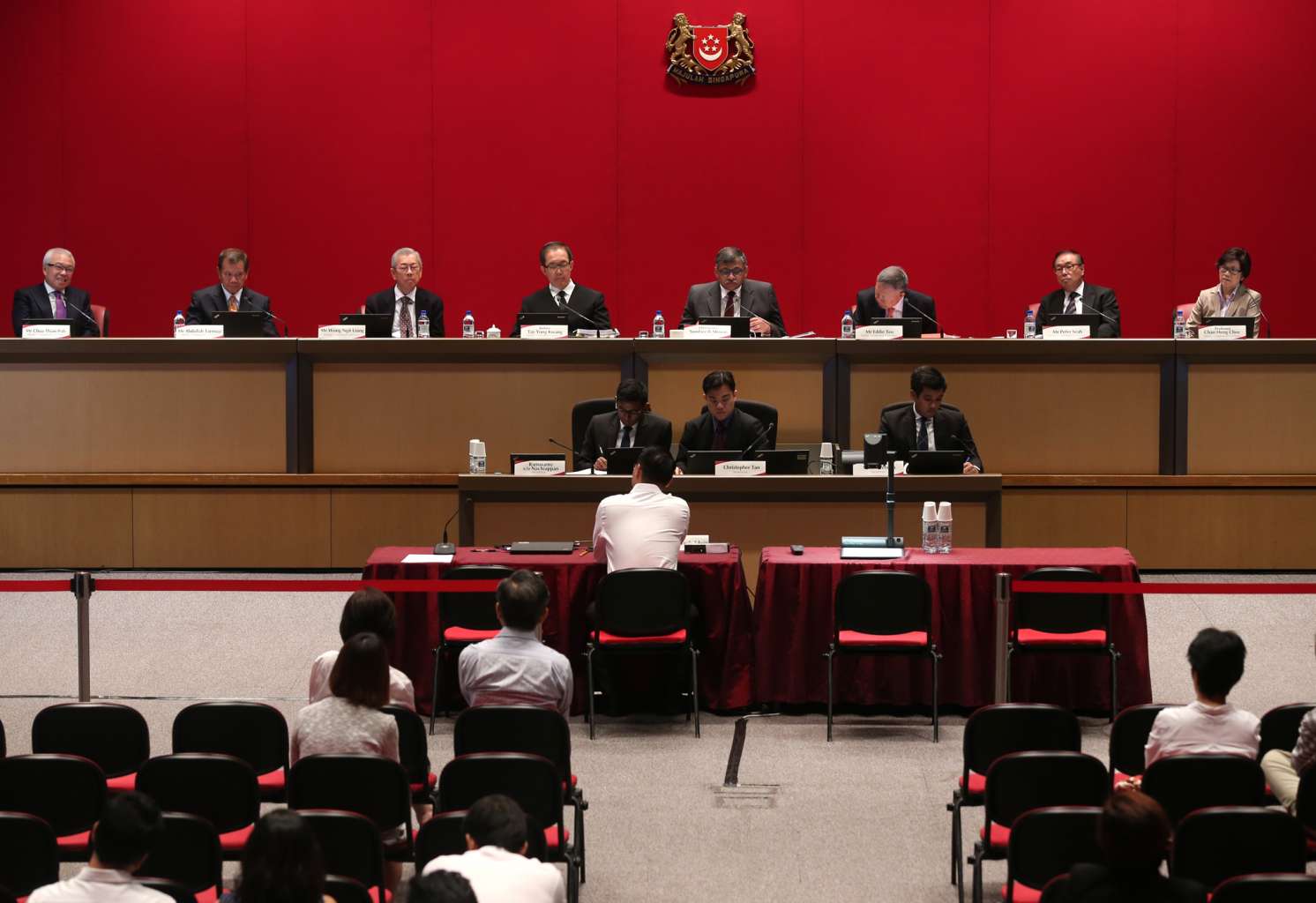Panel proposes key changes to elected presidency
It suggests raising eligibility criteria and introducing way to ensure minority president
Sign up now: Get ST's newsletters delivered to your inbox

Members of the Constitutional Commission at the first public hearing on the review of th elected presidency, held at the Supreme Court on April 18 2016.
PHOTO: ST FILE
Significant changes are set to be made to the elected presidency to ensure candidates are amply qualified and representative of Singapore's multiracial society.
A Constitutional Commission has suggested that the bar to contest presidential elections be updated to reflect the growth of the economy and the national reserves.
Candidates from the private sector should have been the top executive of a company with at least $500 million in shareholders' equity, a change from the current rule requiring the person to have been chairman or chief executive of a company with paid-up capital of at least $100 million.
A special provision has also been recommended to guarantee that the highest office is accessible - and attainable - by members of the country's minority communities.

If someone from any of three racial groups - Chinese, Malay, or Indian and Others - has not been president for five terms, the next election should be reserved for members of that race.
This means that if the proposed provision takes effect immediately, the next election would be reserved for only Malay candidates. And if there are no presidents from the Indian and Others group elected after that, the 2041 election would be reserved for a candidate from that group.
The size and structure of the Council of Presidential Advisers (CPA) should be strengthened too, and it should be consulted on all fiscal matters on the reserves and all key public service appointments.
Details of the recommendations by the nine-member panel are set out in a 154-page report that the Government released yesterday.
The commission was set up seven months ago to review three aspects of the 25-year-old elected presidency: the qualifying process, ensuring minority representation, and the framework by which the president exercises his custodial powers, in particular the CPA's role.
Prime Minister Lee Hsien Loong, who is in Laos for Asean meetings, said in a letter to the commission chairman, Chief Justice Sundaresh Menon, that the Government accepted in principle the main recommendations. Acting Prime Minister Teo Chee Hean said the commission had produced a "comprehensive and thoughtful report, after an extensive process to solicit views from the public".
The Government will give a detailed response in a White Paper next Thursday. It will then table constitutional amendments and have a full debate in Parliament.
The panel also gave its views on some matters beyond its terms of reference, and PM Lee said the Government will study them seriously. In particular, it suggested the Government consider a return to a president appointed by Parliament if and when it was fit and timely to do so.
PM Lee said: "While I appreciate the commission's reasons for this suggestion, as the Government has pointed out even when the scheme was first conceived, it would be difficult for a president to exercise custodial powers over the reserves and public service appointments, and veto proposals by the Government, without an electoral mandate."
Likewise, the panel noted that founding Prime Minister Lee Kuan Yew had said the president must be elected to have the moral authority to say no to a Government that might wish to spend past reserves.
Though the custodial role has been in focus in recent years, the panel stressed the president's historical role as a unifying symbol of the nation was equally important.
The next presidential election is due in August next year. The previous election in 2011 was hotly contested and saw four candidates deemed eligible. The commission noted that some of them did not seem to understand the role and remit of the president, and made campaign promises they could not keep if elected.
To avoid misleading voters, the panel called for rules to make sure candidates know what the president can and cannot do.
The commission also sought the views of President Tony Tan Keng Yam, and former president S R Nathan before he died last month.
Dr Tan said yesterday the amendments "will be a milestone for Singapore in ensuring the elected presidency scheme stays relevant with time and in our local context".
He also said he would study the report and give his views when Parliament debates the changes this year.
Several contributors had also suggested deferring the changes so candidates who meet existing rules would not be excluded next year.
Under the proposed eligibility criteria, only two of the candidates in the 2011 election would qualify if the 2017 election is open: Dr Tony Tan and Mr Tan Kin Lian. The other two, Dr Tan Cheng Bock and Mr Tan Jee Say, would not qualify.
The commission said when the changes take effect "was a political matter for Parliament to determine". "Moreover, the Commission observes that it would be incongruous for it to conclude that changes are called for to safeguard the nation's vital interests, but for it then also to propose... that these be deferred for at least seven years."
SEE TOP OF THE NEWS


